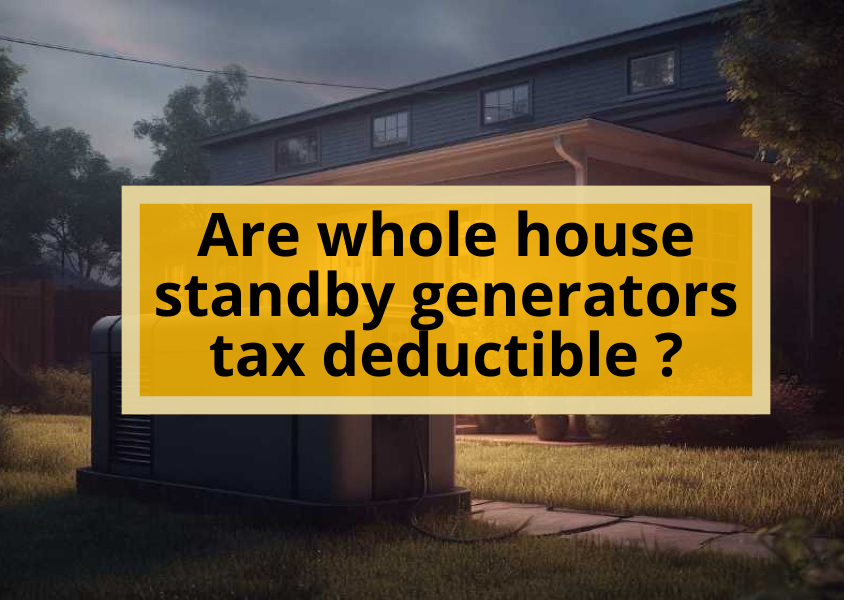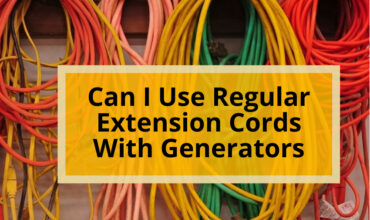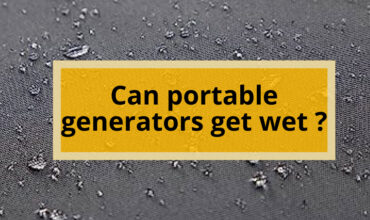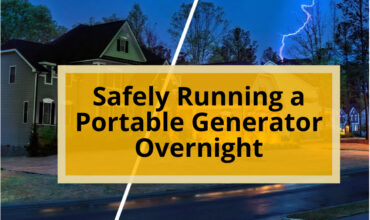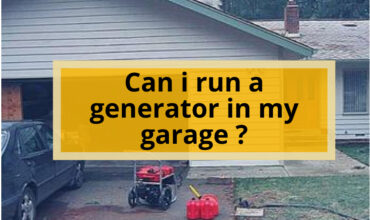With power outages becoming increasingly common, more homeowners are installing whole house standby generators to keep the lights on when the power goes out. These generators are a major investment, often costing upwards of $10,000 installed. This leads many homeowners to wonder – can I deduct the cost of a whole house generator on my taxes?
Unfortunately, the answer is not straightforward. There are a number of factors that determine whether the IRS will allow you to deduct a whole house generator. In this comprehensive guide, we’ll walk through everything you need to know about deducting the cost of a whole house standby generator on your taxes.
What are Whole House Standby Generators?
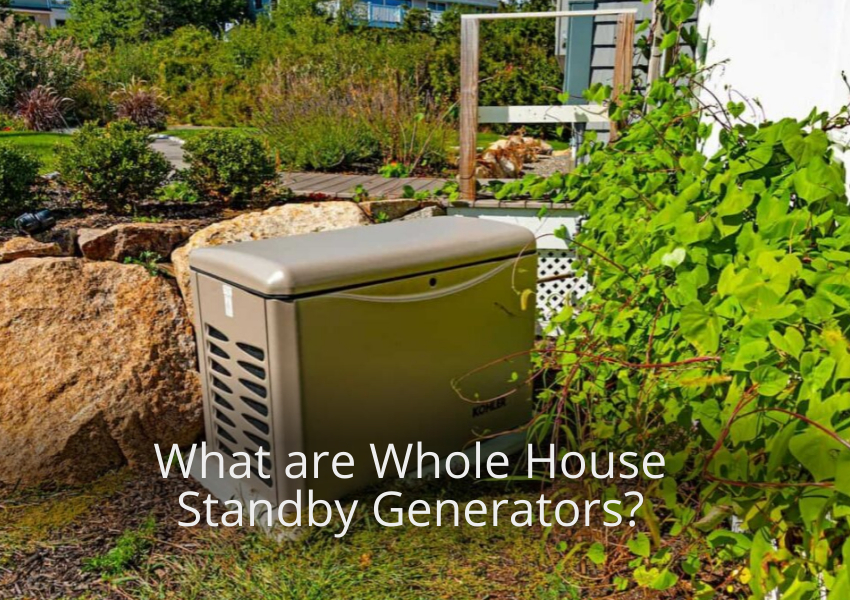
Before we dive into the tax deductibility, let’s quickly review what whole house standby generators are and how they work. A whole house generator is an automatic backup power system that kicks in instantly when the power goes out.
It runs on natural gas or propane and is permanently installed outside your home. It is connected to your home’s electrical system and will automatically detect power outages, at which point it will switch on to restore power to your entire home.
Whole house generators can power critical systems like heating/AC, refrigerators, freezers, sump pumps, security systems and more. This allows you to maintain a comfortable living environment even during prolonged power outages. Key benefits include automatic operation, powering entire home, and running on natural gas or propane so there is no need to refuel.
Rules for Deducting Home Improvements
Generally speaking, home improvements fall into two categories when it comes to taxes – improvements that are deductible and those that are not. Here are some key facts:
– Improvements that add value to your home or extend its useful life are typically not deductible. These are considered capital expenses. Items like remodelling the kitchen, adding a bedroom, upgrading the flooring or roofing fall into this category of improving functionality or aesthetics.
– Maintenance and repairs that keep your home in good working order are usually deductible in the year paid. Examples include repainting interiors, fixing appliances, regrouting tile, fixing leaks, etc. These maintain your home rather than improve it.
– You can only deduct the costs if you itemize your deductions. Those who take the standard deduction cannot write-off home improvement or repair expenses.
So where do whole house generators fall amongst these categories? Let’s take a closer look…
Also read : Are Portable Generators Dangerous?
Are Whole House Generators Value-Adding Improvements Or Maintaining Your Home?
When determining if a whole house generator is deductible, the key question is – does it add value to your home, or is it maintaining your existing home? Unfortunately, there is no clear IRS guidance on exactly how whole house generators should be treated. There are reasonable arguments on both sides:
- Improving Your Home – One could argue that adding a whole house standby generator is improving your home by giving it a new system that it did not previously have. Some key points:
– Generators are brand new additions that are permanently installed. This suggests it is more akin to adding a new room versus replacing an existing worn-out system.
– Generators increase the functionality of your home by providing automated backup power. This enhanced functionality adds value.
– Homes with generators installed often have higher property values and may be easier to sell. The added value could suggest the generator is an improvement versus maintenance.
– Generators require extensive installation costs. Improvements usually involve significant expense for new additions.
- Maintaining Your Home – On the other hand, there are also arguments that generators simply maintain normal home operations:
– Generators provide temporary backup power when systems fail; they are not intended for continuous use. This supports deductibility like other home repairs.
– Generators keep critical systems like heating, refrigeration and security working. This maintains your lifestyle, rather than adding new capabilities.
– Generators are installed in lieu of alternative backup options like solar panels. This suggests it is substitute maintenance rather than an upgrade.
– Generators restore existing systems to working order rather than adding new electrical systems to the home. Restoring existing functionality supports deductibility.
With credible arguments on both sides, there is uncertainty around whether the IRS would consider generators as improvements or maintenance. Unfortunately there is very little IRS guidance on this specific issue.
Also read : Can I Install My Generator Myself ?
Other Relevant Tax Rules For Generators
If you can establish that your whole house generator constitutes a home maintenance expense rather than an improvement, there are some other IRS rules that come into play:
– Itemizing deductions – As noted earlier, you can only deduct home maintenance expenses if you itemize deductions on Schedule A. You also have to itemize in the same year that the expenses occurred.
– Deduction limit – Home maintenance deductions are subject to a 2% AGI limit. This means you can only deduct maintenance costs to the extent they exceed 2% of your adjusted gross income. So if you have $10,000 in maintenance expenses and an AGI of $100,000, only $8,000 would be deductible.
– Time for deduction – Maintenance expenses are deductible in the tax year they are paid, regardless of when the work occurs. So if you pay for a generator in 2022 but installation happens in 2023, you deduct in 2022.
– Partially business – If you use your home partially for business purposes, you may be able to deduct a larger percentage of maintenance costs. You have to properly calculate the business use percentage.
– Medical need – Costs associated with installing equipment on doctor’s orders for medical reasons can potentially be included as part of a larger medical expense deduction. This requires meeting a 10% AGI threshold for total medical expenses.
– Energy credit – As of 2021, standby generators may qualify for a 26% federal tax credit under the residential clean energy credit program. There are capacity and efficiency requirements to qualify.
The bottom line is that if the maintenance deduction applies, you still have to consider these additional rules to properly take advantage of deducting your generator costs. Proper recordkeeping is essential.
Also read : Power Up Your Home: Sizing Guide For Generators
Should You Try Deducting Your Generator?
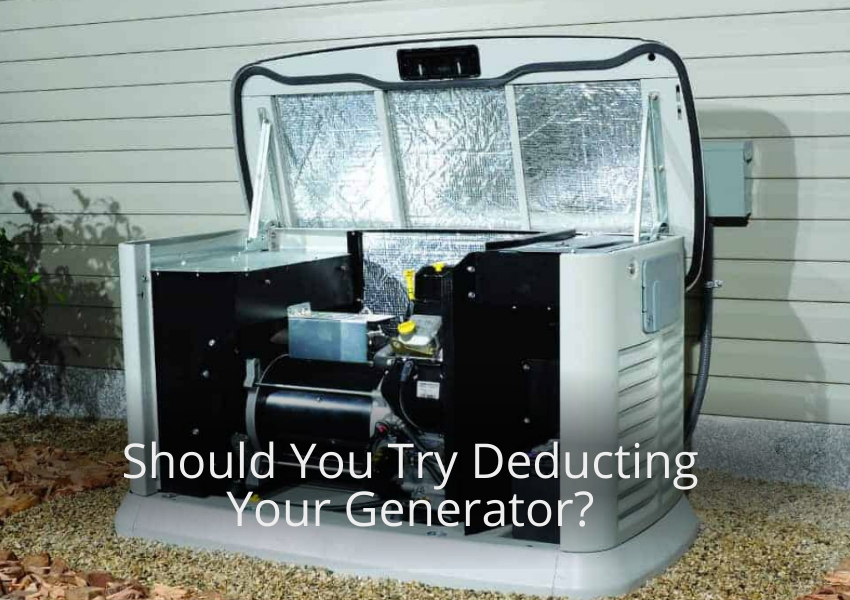
Given the ambiguous nature of IRS rules on whole house generators, some homeowners may consider trying to claim a deduction even if they are unsure generators clearly meet the definition of a maintenance cost. While this may work, there are risks:
– Audit – Claiming ambiguous deductions increases your chances of getting audited. Issues like home improvements are known audit triggers.
– Penalties – You can face penalties and interest if deductions are denied upon audit. An inaccurate tax return can also suspend the statute of limitations on audits.
– Reputation – Getting flagged for an audit can harm your reputation with the IRS and cause extra scrutiny of future returns.
– Qualifications – Failure to meet all requirements like itemizing and 2% AGI limit will lead to a rejected deduction.
– Time period – Deductions denied due to audit could impact multiple tax years.
For these reasons, it is usually advisable to be conservative and only claim deductions you are reasonably confident meet IRS requirements. The potential audit exposure outweighs the tax savings in most cases.
That said, because generators do offer some credible arguments for being categorized as maintenance, you may decide the risks of deduction are low enough to proceed if your individual circumstances warrant it. Thorough documentation is essential, and consultation with a tax professional is highly recommended before claiming any uncertain deductions.
FAQ
Are installation costs for a whole house generator deductible?
Installation costs would be deductible if the generator itself is deemed a deductible maintenance expense. The total costs including materials, labor, permits, etc. would potentially be deductible subject to the rules covered in the article.
What if I use the generator for business purposes occasionally?
Use of a generator for any business purpose opens up potential for greater deductibility, but the business use percentage would need to be properly documented and calculated. Mixed personal and business use can complicate taxes.
Can I deduct a generator that also powers items like a hot tub or pool?
If the generator powers any luxury items like hot tubs, the portion of the expenses related to those items would likely not be deductible as they do not maintain normal household necessities. The deductible percentage may be reduced.
Are maintenance and repair costs deductible in future years?
Yes, any costs for maintaining, repairing and operating a whole house generator would be deductible in the years those costs are incurred, subject to tax rules.
Can I deduct a portable generator instead of a whole house model?
Portable generators are unlikely to be deductible as they are not permanently installed and often used for non-essential purposes. A whole house model is required for any argument of deductibility.
How can I deduct the cost of a whole house standby generator as a medical expense?
To deduct the cost of a whole house standby generator as a medical expense, the generator must be used primarily for medical purposes. For example, if you have a sleep apnea machine that requires electricity to operate, you may be able to deduct the cost of a generator if you use it to power your machine during a power outage.
To claim the medical expense deduction, you will need to itemize your deductions on your tax return. You will also need to provide documentation of your medical condition and how the generator is related to your medical needs.
How can I deduct the cost of a whole house standby generator as a business expense?
To deduct the cost of a whole house standby generator as a business expense, the generator must be used primarily for business purposes. For example, if you have a home office and you use the generator to power your office equipment during a power outage, you may be able to deduct the cost of the generator.
To claim the business expense deduction, you will need to itemize your deductions on your tax return. You will also need to provide documentation of your business use of the generator.
How can I deduct the cost of a whole house standby generator as a disaster loss?
To deduct the cost of a whole house standby generator as a disaster loss, the generator must have been located in the disaster area at the time of the disaster. You must also have sustained uninsured or unreimbursed damage to your property as a result of the disaster.
To claim the disaster loss deduction, you will need to file Form 4684, Casualties and Thefts, with your tax return. You will also need to provide documentation of the damage to your generator and any other property that was damaged in the disaster.
How can I depreciate the cost of a whole house standby generator?
If you cannot deduct the cost of your whole house standby generator as a medical expense, business expense, or disaster loss, you may be able to depreciate the cost of the generator over time.
Depreciation is a way to deduct the cost of certain assets over the period of time that the assets are used. To depreciate a whole house standby generator, you will need to determine the estimated lifespan of the generator and then deduct a portion of the cost of the generator each year over the lifespan of the generator.
To claim the depreciation deduction, you will need to file Form 4562, Depreciation and Amortization, with your tax return. You will also need to keep detailed records of the cost of the generator and the depreciation deduction that you claim each year.
Should I consult with a tax advisor before claiming a tax deduction for a whole house standby generator?
Yes, it is always a good idea to consult with a tax advisor before claiming a tax deduction for any major purchase, including a whole house standby generator. A tax advisor can help you determine whether you qualify for a tax deduction and can help you prepare the necessary paperwork to claim the deduction.
Conclusion
In summary, while there are reasonable arguments on both sides, the ability to deduct the cost of a whole house standby generator remains an unclear area of tax law. Consultation with a tax professional is recommended before claiming deductions. Proper documentation and compliance with all IRS rules is essential to lower audit risks if you decide to proceed with a deduction claim.
